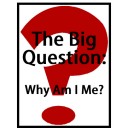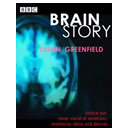The Big Question: Why Am I Me?
 There are 6 billion people on the planet. Every single one of them are unique individual.
There are 6 billion people on the planet. Every single one of them are unique individual.
We each have thougths and ideas and memories and feelings. What is happening in your brain when talking and listening?
This is not about mechanics of speaking, listening and understanding a language. This is about subjective sensation of being you.
British scientist Susan Adele Greenfield who brings attention to Alzheimer's disease and Parkinson's disease, explains how the brains generate a mind that is individual to each of us.Welcome to the mysterious world of neurons.




If we were to take a child at birth and put it in total isolation in the dark without any kind of stimulation and it survived to 20 years, would it have feelings, emotions, or even thoughts and awareness? My guess is no. Every person has to have stimulation from outside the body to learn emotions, feelings, and thoughts. The person develops awareness only when it can learn and think. As the brain develops the awareness becomes more real. Of course this is just theory and I'm probably out to lunch on this.
Incredible, I thought the same a couple of years ago, I totally agree that humans are forged by outside stimulus.
love it
You are you because nobody else wanted the job. I mean look at you.
this documentary: if a car moves forward there is smoke coming out. no, we are not even close to understand anything about consciousness. one reason for that is the complete lack of understanding that consciousness is not just brain, its an analogous computer of 100 trillion cells surrounded by 70 sextillion stars and .. well countless other things. the complete lack of understanding that there is a connection between all that. that's factorial 70sextillion for the stars alone.
The question may be posed only by an individual of an evolved sentient species, as far as we know.
All the Mes [plural of 'me'] are identical in that genetics and socialization aside the respective mes cannot be distinguished, let alone proven to exist. I can witness my own me for myself, and I fancy all other critters with sufficient dispositions can as well. Dreams are impossible to 'prove'. So is...wait for it!...pain.
13.6 billion years of Cosmic evolution and we're all individually getting screwed. What's going to keep you from popping into existence again? 'Neural plasticity', better stick to that if ya wanna keep your scientific credibility...really, I understand.
George S. Patton's 'poem' in the movie "Patton" ..."but always me" may be more than just reincarnation drivel. Biology shows that de facto 'resurrection' of the body (via the womb) is a cinch. Resurrection of the Mind, forgetaboutit! ... Oh, instinct! Oh, books! Oh, culture!
Nevertheless, Mes are an indistinguishable commodity, outward visible signs varying by genetic and social capacity.
So what, whatever...
no you are not me you are you and i am me
some of the people here dont seem to know much about abstraction and computer science .
I think most commenters are missing the point of this documentary. It's about how our brains are shaped by "nurture" and experience to create our uniqueness as individuals. It didn't try to answer the "root of consciousness", as science hasn't discovered that yet, though it did give some interesting visuals of what consciousness looks like in terms of brain activation. Also pecenaprasetina, we're not just unique because we have unique DNA (how would you account for differences in identical twins?) because some aspects of our DNA can be activated, or not activated based on environmental cues. Overall, this was a good summary of neural plasticity. Wish I'd seen this when I was studying for my first biopsych class, would have been a good study aid.
i know this is a fully uninformed opinion as i haven't yet watched the doco but i have a distinct impression that this film does nothing to answer the question Why Am I Me? and not any of the other 7 billion plus humans or 100 billion plus anthropods or even perhaps any one of the potential trillions of trillions of life-forms in the universe. That said, i'm not religious but i feel it's quite beyond the grasp of anything we currently know.
we don't have the same brains because we all have a different DNA LOL dumb bitch
lol
reference to her population quote-infra---not cells!
I thought of something toward the end. If it were possible to program emotions into the chess playing computer would it improve or impede the performance of the computer? Obviously it wouldn't perform as well with emotions so maybe we should try and learn from computers and distance ourselves from emotions in tasks most tasks to improve our performance
emotions in a chess game are irrelevant therefore it would make no difference.
emotions in a chess game are irrelevant therefore it would make no difference.
hmm but how can you program emotions into the playing computer? If you program it will it still be as true as the emotions we feel because the computer will just be following the programmed script? It is difficult to imagine how a computer can ever truly feel.
Just read your post and would like to offer my 2 cents to perhaps justify I think emotions and non-thinking are integral to numerous things in life: Some one makes you smile or laugh; you sense danger; your playing chess or any game and you sense opponent frustration or whatever allowing you to make a non rational move; and most importantly in Art - all music would sound like techno or bethoveen (robotic or scalular music) without any feel , like funk or rock (from musician interaction).
I believe this is a major distinction between us and animals: it seems like animals can sense better while we think better...
Try closing you eyes and feel the world rather than think (dream) sometime...something I used to practice and enjoy from martial arts
skipped the main question. Look, you have a brain and I have a brain, you have emotions and I have emotions. But why am I ME and why are YOU YOU? That seems to be the important question to me. Not, why does this person have the thoughts, emotions, character etc. that he or she does, but why is that person, with those characteristics, ME? After all, as far as the mechanism goes, all brains have the structures that would bring about subjective experience. So why is THIS one MINE? Nobody seems to be addressing that one.
hahaha i agree, she only answered what we already know
A Genuine Scientist, would never use the word's "I Believe"
No, scientist will say "I believe" when they're not sure what they're saying is fact. It's an opinion. If they say "I know", "It's a fact" on something that they aren't really sure yet, that's called fraud or delusional scientist
A creature with just only mind, intelligence, emotions, body and the ability of consciousness, it would be just a kind of zombie or a computer (with emotions).
Let's suppose that consciousness, mind or emotions had never existed, so, would have a universe with noting that know it exist. The main question that comes is: Why am I here? And what does it all mean? There is something more complex that make as a living creature with the power to feel the universe and ourselves. If there is a universe and creatures that can feel this universe and themselves, it is most probably because there is some intelligence back stage that wants to manifest its existence.
than where and what is that intelligence? with no evidence or proof you cant run to conclusions. what is that in our brain that gives us consciousness and how does it relay work?
That is true Billy. There most be some intelligent designer behind this universe and the rest universes (if there is anyother)
Interesting....
I believe the brain is a very intricate computer, but the essence of being "I" or "ME" is beyond the realm of the five senses.
Being aware that your aware and being aware of that.
P.S. i'm not religious
imagitrons and preceptrons
imagitrons and preceptrons
NO disrespect to the people involved with this documentary but this wasn't interesting or educational. It was a lady who spoke in detail of what most of us already know.. We are who we are based on emotions and our brain.. Go figure !
I found this one sorta boring...and I'm always game for a good psychology doc...
maybe emotion is developed through all our senses.. what if we gave a computer a nervous system and then hit it? would it then fear us knowing that we can give it pain? hence develop an emotion of fear towards pain? maybe emotion simply is something we learn
"Anyone interested in consciousness should google Julian Jaynes."
Also look up Robert Anton Wilson, a brilliant man and one of my favorite authors.
Anyone interested in consciousness should google Julian Jaynes.
Consciousness is nothing more than a product of what the brain does. There is no ghost in the machine. No soul, no disembodied spirit. We are all sphiticated meat bots.
how so? How does it come about? I'm not saying I have an answer, but you seem to think you do.
What causes emotions other then mechanistic processes in the human brain? Is there some supernatural force that allows humans to feel emotions? If not, what prevents an emotional silicon based being from potentially existing, other then lack of current technological ability?
u mean carbon based, our brain is just a supercomputer that we haven't cracked yet
The idea of the brain as a computer is far too reductionist.
In all times, people have tried to understand the world in terms of the technology they possess, such as how the universe was pictured as a giant clockwork mechanism during the 1800s - similar to the machines they were developing at the time.
But this is always overturned by new understandings.
meh... that was not very good :\
the mind and personality are such more complex that it is useless to try and explain it in 23 minutes !
Max wrote:
"The film highlights the vast intricacy of interaction between individual cells within the brains of all animals, and proposes that this interaction is what we call consciousness.
The idea of the self, as a conglomeration of experience, captured within an amorphous neural network.
This is important when considering deceptively larger ideas of ‘why am I here’ or ‘what does it all mean’."
Beautifully and elegantly stated. Well put, my friend! Nicely captured. Your explanation was somewhat better than the documentary! LOL!
YAWN!
Emotions are just the thing that makes us robots. Not rational thinking. Emotions are things that are out of our control, not things that we control.
Js, emotions don't occur in the heart in the poetic sense, they all take place in the brain. However heart rate is a physiological part of many emotions.
i'll like to know if emotions are linked to the heart. ??
Very interesting. It's a bit short, but well worth it.
The film highlights the vast intricacy of interaction between individual cells within the brains of all animals, and proposes that this interaction is what we call consciousness.
The idea of the self, as a conglomeration of experience, captured within an amorphous neural network.
This is important when considering deceptively larger ideas of 'why am I here' or 'what does it all mean'.